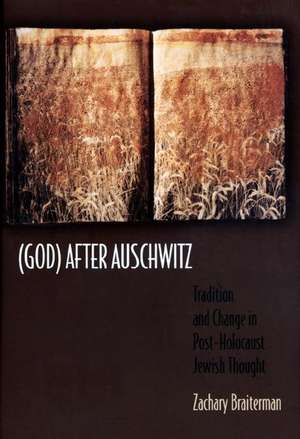(God) After Auschwitz – Tradition and Change in Post–Holocaust Jewish Thought
Autor Zachary Braitermanen Limba Engleză Hardback – 22 dec 1998
This book is the first to bring postmodern philosophical and literary approaches into conversation with post-Holocaust Jewish thought. Drawing on the work of Mieke Bal, Harold Bloom, Jacques Derrida, Umberto Eco, Michel Foucault, and others, Braiterman assesses how Jewish intellectuals reinterpret Bible and Midrash to re-create religious thought for the age after Auschwitz. In this process, he provides a model for reconstructing Jewish life and philosophy in the wake of the Holocaust. His work contributes to the postmodern turn in contemporary Jewish studies and today's creative theology.
Preț: 644.58 lei
Preț vechi: 837.12 lei
-23% Nou
Puncte Express: 967
Preț estimativ în valută:
123.38€ • 134.06$ • 103.71£
123.38€ • 134.06$ • 103.71£
Carte tipărită la comandă
Livrare economică 21 aprilie-05 mai
Preluare comenzi: 021 569.72.76
Specificații
ISBN-13: 9780691059419
ISBN-10: 0691059411
Pagini: 204
Ilustrații: 2 halftones
Dimensiuni: 169 x 241 x 19 mm
Greutate: 0.48 kg
Ediția:New.
Editura: Princeton University Press
Locul publicării:Princeton, United States
ISBN-10: 0691059411
Pagini: 204
Ilustrații: 2 halftones
Dimensiuni: 169 x 241 x 19 mm
Greutate: 0.48 kg
Ediția:New.
Editura: Princeton University Press
Locul publicării:Princeton, United States
Notă biografică
Descriere
Argues that the impact of technology-enhanced mass death in the twentieth century has affected the future shape of religious thought. This book shows how key Jewish theologians faced the memory of Auschwitz by rejecting traditional theodicy, abandoning any attempt to justify and vindicate the relationship between God and catastrophic suffering.
